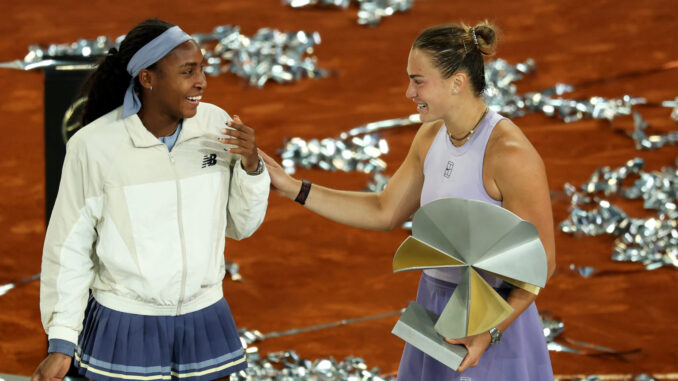
In a clash of titans at the 2025 Madrid Open final on May 3, Aryna Sabalenka, the world’s top-ranked women’s tennis player, showcased her tactical brilliance to secure a 6-3, 7-6(3) victory over No. 4 seed Coco Gauff. The Belarusian’s third Madrid title, tying Petra Kvitova’s record, was a testament to her relentless power and strategic acumen, particularly in exploiting Gauff’s second serve. Former British player Annabel Croft highlighted a key move: Sabalenka positioned herself closer to the baseline on Gauff’s second serves, a tactic that pressured the American into eight double faults, including a critical one that sealed Sabalenka’s 20th career title. This victory not only solidified Sabalenka’s dominance but also leveled their head-to-head rivalry at 5-5, setting the stage for more epic battles.
Sabalenka’s game plan was evident from the outset at the Caja Magica. She surged to a 4-1 lead in the first set, winning 17 consecutive points by hammering Gauff’s second serves, which landed shorter due to Gauff’s spin-heavy, nervy delivery. “I think noticeable when you watch Sabalenka on return of serve, she is much closer to the baseline,” Croft observed, noting how this aggressive stance neutralized Gauff’s kicking second serve. “When Coco Gauff gets a bit tight, the forehand starts to come really spinny up the back of the ball and lands a lot shorter, and that enables Sabalenka to come in and give it a good crank.” Sabalenka’s 75% win rate on second-serve points, compared to Gauff’s 53%, underscored her dominance in these exchanges, with 42 receiving points to Gauff’s 19.
The second set was a rollercoaster, revealing both players’ fighting spirit. Gauff, who had battled back from a 6-0 first-set loss to Dayana Yastremska in her opener, found her rhythm, breaking Sabalenka to lead 5-3. Serving for the set at 5-4, Gauff faced immense pressure as Sabalenka, down 0-40, clawed back with five break-point opportunities. A light-hearted moment came when Sabalenka’s racket slipped mid-rally, drawing a smile, but her focus never wavered. Gauff saved a set point, but her three double faults in that game, as noted by commentator Colin Fleming, proved costly. “When the pressure is on, that is when your technique is really tested,” Fleming said, lamenting Gauff’s unraveling forehand and serve. Sabalenka broke back to level at 5-5, forcing a tiebreak where she led 3-0, only for Gauff to fight back to 3-3. Ultimately, Gauff’s eighth double fault on Sabalenka’s second match point handed the Belarusian the crown.
Sabalenka’s mental fortitude was as crucial as her tactics. “I’m super happy that I was able to handle my emotions at the end of the second set,” she told reporters, reflecting on the intense tiebreak. “It was really intense and it was a real fight over there.” Her ability to stay composed, despite missing a championship point earlier, echoed her growth since losing to Iga Swiatek in the 2024 Madrid final. Gauff, gracious in defeat, praised her rival’s consistency. “I’d like to congratulate Aryna on an incredible tournament. You’re always tough to face,” she said during the ceremony, acknowledging Sabalenka’s four straight finals. Gauff’s 9-1 finals record slipped to 9-2, but her run, including a 6-1, 6-1 semifinal demolition of Swiatek, propelled her to No. 3, overtaking Jessica Pegula.
Sabalenka’s tactical evolution also shone through. “I’ve been working really hard and improving my game on bringing variety into my game,” she said, citing enhanced movement and touch. Her 68% first-serve win rate and two aces complemented her baseline aggression, tailored to Madrid’s high-altitude clay, where her power thrives. Gauff, with four more winners but seven more unforced errors, struggled to match Sabalenka’s precision under pressure. As both players head to the Italian Open, where Gauff holds a 2021 clay win over Sabalenka, their rivalry promises more fireworks. For now, Sabalenka’s bold return strategy and mental steel have cemented her as Madrid’s queen, ready to chase her first Roland Garros title.
Leave a Reply